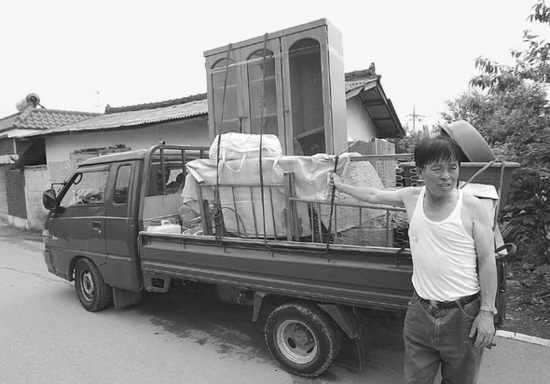 |
|
On June 11, Hong Myeong-gi moves items remaining at his old home in Daechuri, Pyeongtaek, Gyeonggi province to his new apartment nearby. Kang Chang-gwang chang@hani.co.kr
|
"I feel uneasy all the time. And whenever I drink, I want very much to return to Daechuri. My old mother sits every day, her mind blank, apparently from homesickness."
This is the voice of Mr. Jeong, whose hometown is the Daechuri district of Pyeongtaek, Gyeonggi province. When the government told him it was time to leave, Mr. Jeong, 47, fled from the village with his family quickly, leaving all of their household goods behind. Their secret flight was because they wanted to avoid neighbors who would be angry with their agreement to uproot. Mr. Jeong received as much as 1.4 billion won (1.4 million USD) as compensation for his land. The money, however, cannot seem to relieve a yearning for his hometown. Mr. Jeong now lives in a lavish house in another part of Pyeongtaek, but he says, "I felt happy living alongside warm-hearted neighbors in Daechuri."
A considerable number of people who had to leave Daechuri due to the relocation of U.S. military bases there are having trouble acclimating to their new homes. The Hankyoreh conducted face-to face and telephone interviews June 2-9 of 27 out of the 96 households who initally accepted compensation to leave Daechuri.
Twenty-five out of 27 persons who responded complained of difficulties in adapting to a new environment after leaving their longtime home. They were 56.6 years old on average, with about half 60 or older; many cited age as part of the difficulty of adjusting.
Hong Chang-yu, 68, who lives with his wife in an apartment in Paengseongeup, Gyeonggi province, said, "At Daechu-ri, old women of the village prepared meals for us, and it was fun mingling with other old folks, but it is different here. At home here, I feel locked inside the walls, and if I go outside, there are few people that I know."
Besides problems adjusting emotionally, former Daechuri residents face difficulty in continuing their livelihood. When at Daechuri, only one out of the 27 residents surveyed was out of work, but now an additional eight are jobless. Twenty-one of those surveyed were previously engaged in agriculture or animal husbandry, as Daechuri was primarily a farming community, but that number has decreased to four. Three of those surveyed have become day laborers. An old man, 70, who gave only his last name Lee, said, "I am looking for a job, but I can’t find one because of my old age."
Mr. Lee was given about 100 million won in compensation. He says he was flooded with phone calls every day from people after his money, which made him sad, he said. Mr. Kim, 60, said, "I received numerous calls from real-estate agencies in Seoul. They urged us to invest in land or a shopping center, but we are not inclined to do so."
The 27 households surveyed left Daechuri about four months ago, receiving an average of 421 million won as compensation. Out of the 61 relocated households whose new addresses were known, 33 were living in Paengseongeup and 22 in Pyeongtaek. Among the remaining six families, two were living in Anseong, one in Anjung, another one in Osan (all Gyeonggi province) and two in Seoul. Only sixty-six households remain at Daechuri.





